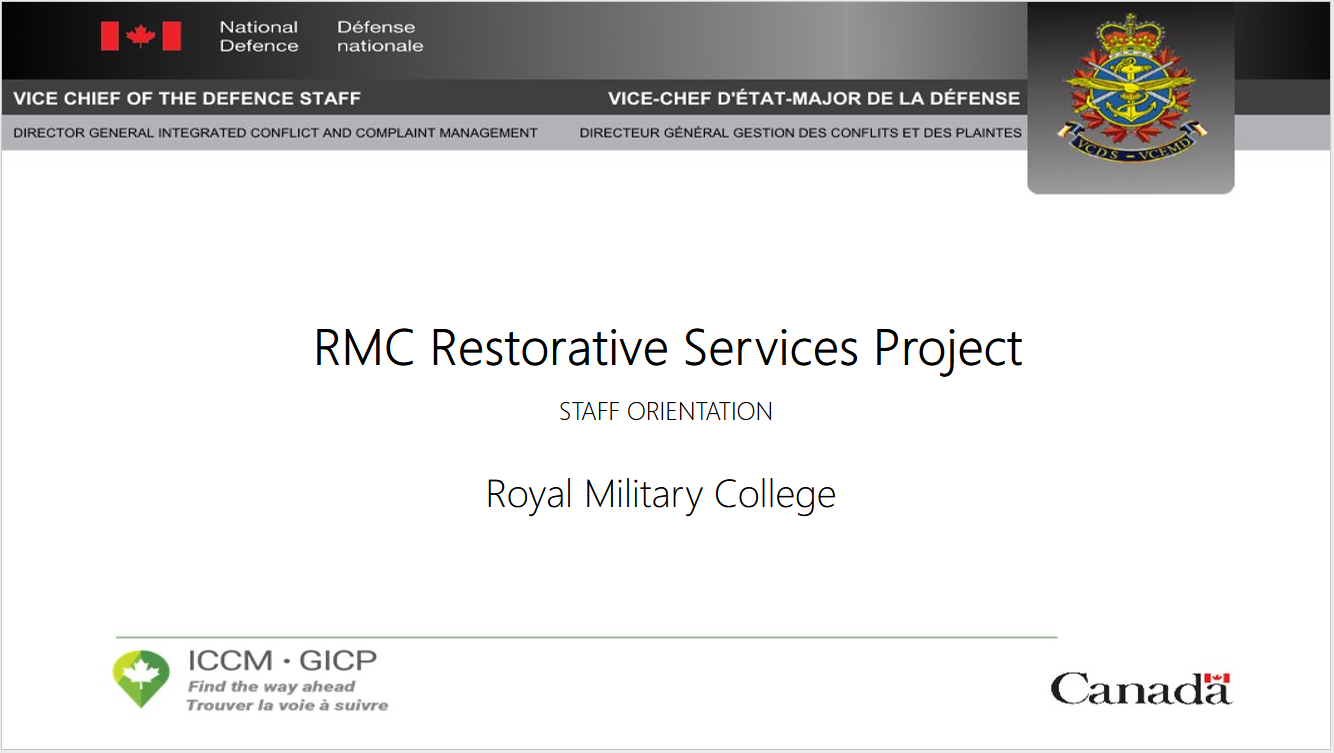What is Restoration?
Restoration addresses HARM in the workplace, such as a harassment investigation, a complaint of bullying or sexual misconduct, racially motivated discrimination, employee terminations, or organizational change - all of which can be a damaging experience for employees and leadership.
Conflict Resolution vs. Restorative Practice
- Undisputed harm
- Harmed –driven
- No shared contribution
- Accountability/Responsibility
Definitions
- Harmed:
- An individual who has experienced a negative impact from an incident(s) that has led to harm.
- Harmer:
- An individual who takes accountability for a harm.
- Restorative process:
- A process that brings together the Harmed and Harmer (or Institutional Representative), in a safe environment, to address the impact of a harmful incident and repair the harm caused, using a trained restorative facilitator.
- Harmful and inappropriate behaviours:
- Behaviours that undermine safety and respect, and may be a breach of the Canadian Armed Forces’ conduct and Defence Ethics.
Project Principles
- Restoration:
- address and repair harm.
- Voluntarism:
- participation is voluntary and based on informed choice.
- Safety:
- creation of safe space for an expression of impact and views about the harm.
- Inclusivity:
- shows equal concern and commitment to Harmed and Harmer, involving both in the process
- Accountability:
- creating a process that allows the Harmer or an Institutional Representative to take responsibility for the harm, directly to those Harmed
- Respect:
- the process is respectful to the dignity of all participants
Restorative Facilitation Process
- Consultation
- Restorative Facilitation Case Development with each party
- Restorative Facilitation
- Feedback to institution and/or Working Group
When possible, processes will be co-facilitated.
Types of files
- Sexual misconduct
- Harassment
- Discrimination
- General misconduct
- Any behavior that causes harm
Referral Process
- Referrals can be made by email, telephone, or in person.
- Restorative Services will be offered only after all administrative and disciplinary processes are completed or deemed not applicable.
- The project is not diversionary from the Military Justice system.
- Duty to Report – met through referral (civilian referrals queried about reporting)
Primary Referral Sources
- Padres
- Squadron commanders, Divisional Command Teams
- Director of Cadets
- Deputy Director of Cadets
- College Chief
- Training Wing Chief
- Commanding Officers
- Academic Leadership
- Labour Relations
- Union representatives
- Civilian leadership
- Commandant
Inappropriate Referrals
The following conditions will result in a referral being deemed inappropriate:
- No contact order or separation order (unless variance sought and granted)
- Neither Harmer nor Institution is willing to take responsibility for the harm
- An inability to provide a physically and psychologically safe process
- Any other referral deemed inappropriate by CCMS-C Team Lead
Contact
CCMS Kingston
Telephone: (613) 541-5010 ext. 5641
E-mail: ++CCMS Kingston
ccmskingston@forces.gc.ca
Virtual/in person briefings are available upon request
